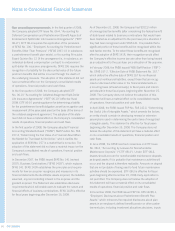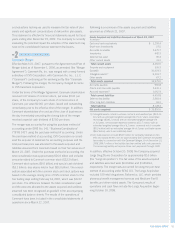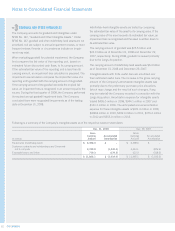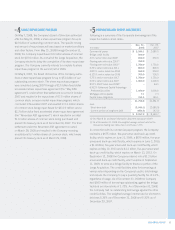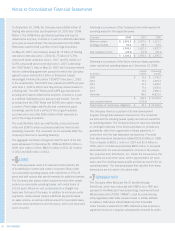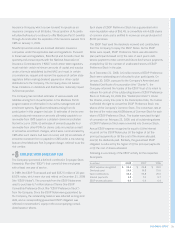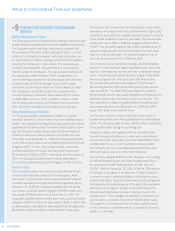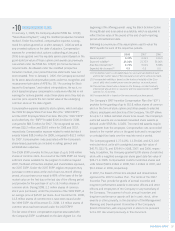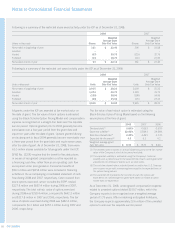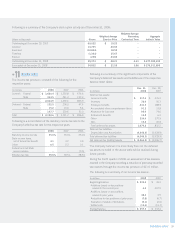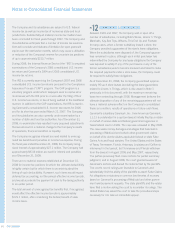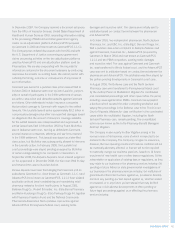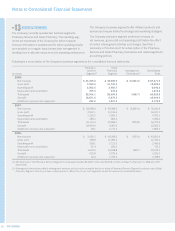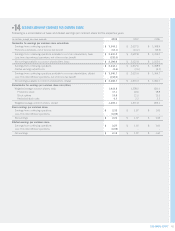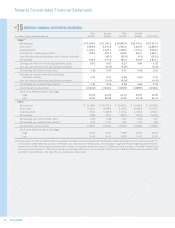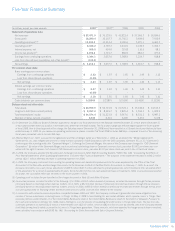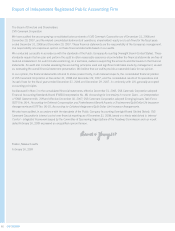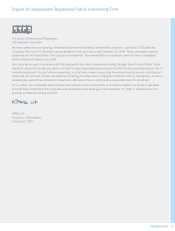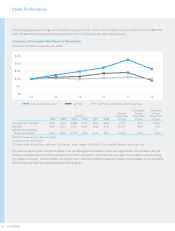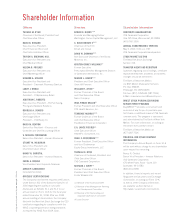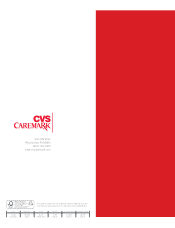CVS 2008 Annual Report Download - page 64
Download and view the complete annual report
Please find page 64 of the 2008 CVS annual report below. You can navigate through the pages in the report by either clicking on the pages listed below, or by using the keyword search tool below to find specific information within the annual report.
60 CVS CAREMARK
Notes to Consolidated Financial Statements
COMMITMENTS & CONTINGENCIES
Between 1991 and 1997, the Company sold or spun off a
number of subsidiaries, including Bob’s Stores, Linens ‘n Things,
Marshalls, Kay-Bee Toys, Wilsons, This End Up and Footstar.
In many cases, when a former subsidiary leased a store, the
Company provided a guarantee of the store’s lease obligations.
When the subsidiaries were disposed of, the Company’s guaran-
tees remained in place, although each initial purchaser has
indemnifi ed the Company for any lease obligations the Company
was required to satisfy. If any of the purchasers or any of the
former subsidiaries were to become insolvent and failed to make
the required payments under a store lease, the Company could
be required to satisfy these obligations.
As of December 31, 2008, the Company guaranteed approxi-
mately 95 such store leases (excluding the lease guarantees
related to Linens ‘n Things, which is discussed in Note 1
previously in this document), with the maximum remaining
lease term extending through 2018. Management believes the
ultimate disposition of any of the remaining guarantees will not
have a material adverse effect on the Company’s consolidated
fi nancial condition, results of operations or future cash fl ows.
Caremark’s subsidiary Caremark, Inc. (now known as Caremark,
L.L.C.) is a defendant in a qui tam lawsuit initially fi led by a relator
on behalf of various state and federal government agencies in
Texas federal court in 1999. The case was unsealed in May 2005.
The case seeks money damages and alleges that Caremark’s
processing of Medicaid and certain other government claims
on behalf of its clients violates applicable federal or state False
Claims Acts and fraud statutes. The United States and the States
of Texas, Tennessee, Florida, Arkansas, Louisiana and California
intervened in the lawsuit, but Tennessee and Florida withdrew
from the lawsuit in August 2006 and May 2007, respectively.
The parties previously fi led cross motions for partial summary
judgment, and in August 2008, the court granted several of
Caremark’s motions and denied the motions fi led by the plaintiffs.
The court’s recent rulings are favorable to Caremark and
substantially limit the ability of the plaintiffs to assert False Claims
Act allegations or statutory or common law theories of recovery
based on Caremark’s processing of Medicaid and other govern-
ment reimbursement requests. The state plaintiffs and the relator
have fi led a motion asking the court to reconsider its rulings. The
United States has asked the court to take the procedural steps
necessary for it to take an immediate appeal.
The Company and its subsidiaries are subject to U.S. federal
income tax as well as income tax of numerous state and local
jurisdictions. Substantially all material income tax matters have
been concluded for fi scal years through 1992. The Company and
its subsidiaries anticipate that a number of income tax examina-
tions will conclude and statutes of limitation for open years will
expire over the next twelve months, which may cause a utilization
or reduction of the Company’s reserve for uncertain tax positions
of up to approximately $213.7 million.
During 2008, the Internal Revenue Service (the “IRS”) completed
examinations of the Company’s 2006 consolidated U.S. income
tax return and Caremark’s 2004 and 2005 consolidated U.S.
income tax returns.
The IRS is currently examining the Company’s 2007 and 2008
consolidated U.S. income tax returns pursuant to the Compliance
Assurance Process (“CAP”) program. The CAP program is a
voluntary program under which taxpayers seek to resolve all or
most issues with the IRS prior to or soon after the fi ling of their
U.S. income tax returns, in lieu of being audited in the traditional
manner. In addition to the CAP examinations, the IRS is examin-
ing Caremark’s consolidated U.S. income tax returns for 2006
and for its short tax year ended March 22, 2007. The Company
and its subsidiaries are also currently under examination by a
number of state and local tax authorities. As of December 31,
2008, no examination has resulted in any proposed adjustments
that would result in a material change to the Company’s results
of operations, fi nancial condition or liquidity.
The Company recognizes interest accrued related to unrecog-
nized tax benefi ts and penalties in income tax expense. During
the fi scal year ended December 31, 2008, the Company recog-
nized interest of approximately $27.1 million. The Company had
approximately $61.8 million accrued for interest and penalties
as of December 31, 2008.
There are no material reserves established at December 31,
2008 for income tax positions for which the ultimate deductibility
is highly certain but for which there is uncertainty about the
timing of such deductibility. If present, such items would impact
deferred tax accounting, not the annual effective income tax rate,
and would accelerate the payment of cash to the taxing authority
to an earlier period.
The total amount of unrecognized tax benefi ts that, if recognized,
would affect the effective income tax rate is approximately
$229.1 million, after considering the federal benefi t of state
income taxes.
NO 12


